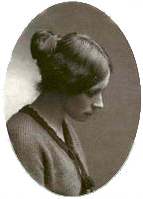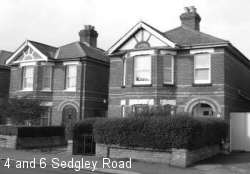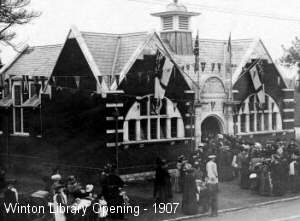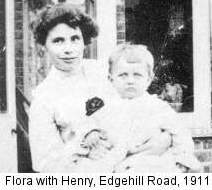|
Flora Thompson
 One
of the acknowledged classics of English literature was written
by a woman who lived in Winton and gained her further education
in Winton library. One
of the acknowledged classics of English literature was written
by a woman who lived in Winton and gained her further education
in Winton library.
Flora Thompson's trilogy Lark Rise to Candleford
is one of the best-loved books in the English language. It was
published sixty years ago, and the past it describes is now a
century away. Yet it remains perhaps the most vivid, detailed
and immediate portrait of country life ever written.
 The
book is really about the Oxfordshire village where Flora was born
in 1876, but in many ways also tells the common tale of life in
the English countryside over a century ago. The
book is really about the Oxfordshire village where Flora was born
in 1876, but in many ways also tells the common tale of life in
the English countryside over a century ago.
Flora Timms left her village school at fourteen
and worked for more than ten years as a clerk in various post
offices. She met John, her husband to be, when they were both
post office clerks in Twickenham. They married in 1903 and shortly
afterwards moved to Winton where he had got a job in the local
post office.
They set up home at 4 Sedgley Road and subsequently
moved next door to Number 6. Their daughter Winifred was born
the following year and christened at St John the Baptist's church
in Wimborne Road.
 A
major event for Flora happened in 1907 - the opening of Winton
Public Library. "For the first time in my life," she
said", I had access to a good public library and slipped
in, like a duck slipping into water, and read almost everything." A
major event for Flora happened in 1907 - the opening of Winton
Public Library. "For the first time in my life," she
said", I had access to a good public library and slipped
in, like a duck slipping into water, and read almost everything."
Only then, she said in an
article published in 1921, "did my real education begin.
The Public Library there was my Alma Mater. I had no guide, and
it was better so. The discovery of each new writer, each set of
new ideas, was the opening up of a new world."
"I went right back to the beginning, read the
Greeks and Romans in translations; read the English poets; the
English novelists; the English critics; nibbled at translations
of the French writers; even tried my teeth upon philosophy and
mysticism! Read Ibsen, Shaw, Yeats and all the Celts. Became enamoured
of the new poetry, at least of the work of those poets who passed
as new in pre-war time, before the day of 'wheels' and 'Coterie'!"
 To
a large extent, Flora's literary vocabulary was built thanks to
Winton Public Library. The library,
incidentally, was one of the first in the country to allow public
browsing of the shelves. Its parent library in Bournemouth was
the very first. Prior to that, books had to be named and ordered
for the readers. To
a large extent, Flora's literary vocabulary was built thanks to
Winton Public Library. The library,
incidentally, was one of the first in the country to allow public
browsing of the shelves. Its parent library in Bournemouth was
the very first. Prior to that, books had to be named and ordered
for the readers.
In 1909 Flora's first son Henry was born, and the
family moved to 2 Edgehill Road.
The following year she bought a typewriter to produce
the minutes of her husband's Postal Clerk Association meetings.
It was rapidly put to more creative use, and in 1911 she won a
competition in 'The Ladies Companion' for a three hundred word
essay on Jane Austen. 
A few months later she won another competition for
an essay on Shakespeare's heroines. Her research almost certainly
depended on the Winton Library.
She also won a competition for a commentary on a
poem about the loss of the Titanic, written by Ronald Campbell
Macfie. The poet decided to congratulate her in person, and remained
an enthusiastic admirer for the rest of her life.
Her confidence boosted by the competition successes,
she began to establish a reputation with a series of articles
that were probably typed out on the kitchen table of 2 Edgehill
Road.
 In
1915 the family moved again to 42 Frederica Road. They named the
house "Grayshott Cottage", as they had their previous
home in Edgehill Road. Grayshott was the name of the Hampshire
village where her working life had really begun. In
1915 the family moved again to 42 Frederica Road. They named the
house "Grayshott Cottage", as they had their previous
home in Edgehill Road. Grayshott was the name of the Hampshire
village where her working life had really begun.
This was to be Flora's last address in Winton and
the last few months there were sad ones. Her brother Edwin had
joined the army and was killed in Belgium early in 1916.
Within a few months they had left Winton. John applied
for and got the job of postmaster at Liphook in Hampshire (at
that time Bournemouth was also in the same county).
Lark Rise to Candleford, Flora Thompson's masterpiece,
was finally completed nearly thirty years later.
The material is drawn from her childhood memories,
but without doubt her ability to write it owed something to the
things she read and learned in Winton Library.
For more about Flora, please visit this
website.
*Picture of the opening of Winton Public Library
courtesy of Bournemouth Library
|